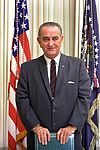Robert Coldwell Wood
Robert Coldwell Wood | |
|---|---|
 | |
| 2nd United States Secretary of Housing and Urban Development | |
| In office January 7, 1969 – January 20, 1969 | |
| President | Lyndon B. Johnson |
| Preceded by | Robert C. Weaver |
| Succeeded by | George W. Romney |
| Personal details | |
| Born | September 16, 1923 St. Louis, Missouri, United States |
| Died | April 1, 2005 (aged 81) Boston, Massachusetts, United States |
| Political party | Democratic |
| Spouse | Margaret Byers Wood |
| Children | Frank Randolph Wood Frances Wood Margaret Wood "Maggie" Hassan |
| Parent(s) | Thomas Frank Wood Mary Bradshaw Wood |
| Residence(s) | Boston, Massachusetts, United States |
| Alma mater | Princeton University Harvard University |
| Profession | Politician |
| Awards | Bronze Star |
| Military service | |
| Branch/service | United States Army |
| Rank | Sergeant |
| Battles/wars | World War II |
Robert Coldwell Wood (September 16, 1923 – April 1, 2005) was an American political scientist, academic and government administrator, and professor of political science at MIT. From 1965 to 1969, Wood served as the Under Secretary of the Department of Housing and Urban Development under President Lyndon B. Johnson, and for two weeks as acting secretary of the department.
After his return to MIT, he directed the Joint Center for Urban Studies at MIT and Harvard. He also had a joint appointment as chairman of the Massachusetts Bay Transportation Authority. He served as president of the University of Massachusetts (1970-1977), overseeing expansion of programs, including construction of a campus in south Boston.
Early life and career
Wood was born on September 16, 1923 in St Louis, Missouri, the son of Mary (née Bradshaw) Wood and Thomas Frank Wood. He won a scholarship to Princeton University, interrupting his studies during World War II to serve in the U.S. Army. Wood saw action during Battle of the Bulge, won a Bronze Star, and rose to the rank of sergeant.
After graduating from Princeton University, Wood earned three degrees from Harvard: a master's in public administration, and a master's and a doctorate in government.[1]
Wood taught political science at Massachusetts Institute of Technology from 1959 to 1965. From 1965 to 1969, Wood served as the Under Secretary of the newly created Department of Housing and Urban Development under President Lyndon B. Johnson.
In 1968, Wood was awarded the Wiener Medal for Cybernetics from the American Society for Cybernetics. Following the resignation of Robert C. Weaver as Secretary of HUD, Wood served briefly in the position for two weeks before George Romney took office.
Wood returned to MIT, where he directed the Joint Center for Urban Studies at MIT and Harvard. At the same time, he was appointed as head of the Massachusetts Bay Transportation Authority (MBTA).
From 1970 to 1977 he served as president of the University of Massachusetts. During these years, Wood led the expansion of the university, to include UMass Medical Center in Worcester and its Boston campus. He also played a key role in bringing the John F. Kennedy Library and Museum to its site at Columbia Point, next to UMass-Boston.[1] He also taught at Wesleyan University.[2]
Personal life
Wood married the former Margaret Byers, on March 22, 1952. They had three children, including the actor Frank Wood and the Governor of New Hampshire and Senatorial candidate Maggie Hassan.[1][3] Wood died from stomach cancer at his home in Boston, Massachusetts, on April 1, 2005.
Publications
Wood's best-known books are:
- 1958. Suburbia: Its People and Their Politics
- 1959. Metropolis against Itself.
- 1961. 1400 Governments; The Political Economy of the New York Metropolitan Region. With Vladimir V. Almendinger.
- 1972. The Necessary Majority: Middle America and the Urban Crisis
- 1993. Whatever Possessed the President? Academic Experts and Presidential Policy, 1960-88.
- 1995. Turnabout Time: Public Higher Education in the Commonwealth. With Richard A. Hogarty and Aundrea E. Kelley.
References
- ^ a b c Sarah H. Wright, "Professor, HUD chief Robert Wood dies", MIT News Office, 6 April 2005, Retrieved 9 June 2008.
- ^ [1]
- ^ Martin, Douglas (5 April 2005). "Robert Wood, Education Expert, Dies at 81". New York Times. Retrieved 21 June 2016.
External links
- Professor, HUD chief Robert Wood dies. MIT April 6, 2005.
- An Inventory of His Personal Papers In the John F. Kennedy Library.
- 1923 births
- 2005 deaths
- United States Secretaries of Housing and Urban Development
- Scientists from St. Louis
- American military personnel of World War II
- American political scientists
- Wesleyan University faculty
- Cyberneticists
- Recipients of the Bronze Star Medal
- Lyndon B. Johnson administration cabinet members
- Deaths from stomach cancer
- Presidents of the University of Massachusetts system
- John F. Kennedy School of Government alumni
- Massachusetts Bay Transportation Authority people


